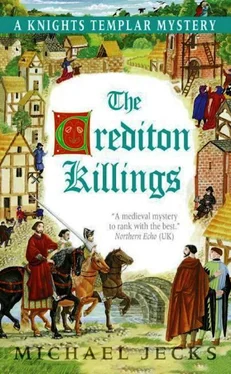Spying a gap in the stream of porters, the innkeeper stepped quickly into his hall. He was determined that Sir Hector would not leave before the bill was settled.
There were fewer men leaving the solar now. Most of the valuables and stores had already been taken to the yard and loaded on to the wagons. From the clattering of iron on stone, the horses were skittishly expectant as they stood by, knowing they would soon be leaving and anticipating the exercise. In his mind’s eye, Paul could see the massive black beast Sir Hector had arrived on, and he gave an involuntary shudder. Proud and arrogant, the horse terrified him.
“You rise early, innkeeper.”
Paul smiled and ducked his head. To Sir Hector he looked at his most obsequious, and the captain was sickened, convinced that, like all innkeepers, all he wanted was his money. Curtly he asked for the reckoning, and the two of them began to negotiate. Paul gave his figure; Sir Hector registered shock and suspicion. Evidence was proffered in the form of empty barrels in the buttery, and rejected on the basis that they might have been half-empty when the mercenaries arrived. Eventually they settled on a sum which satisfied both. If Paul was convinced it gave him only a little profit, at least there was some.
The knight too was content. It had cost him more than he would have hoped, but the charge appeared fair. He carefully counted the coins, sniffing at the expense, then left, striding out to the yard. Ignoring the men standing all round, he stepped onto the mounting stone, and swung his leg over his horse’s back. Once there, he studied his men.
It was a sadly depleted band. When Sir Hector had arrived in Creditor, it was as the leader of a united, battle-hardened force. Now his two sergeants were in jail after stealing from him, his most experienced man was with them awaiting justice for murdering Sarra, and Will had disappeared after the abortive attempt on Sir Hector’s life. Will knew the price for disloyalty. He wouldn’t dare show his face again.
The others stood by sullenly. None wanted to meet his eye, and he considered them silently for a moment. It would be easy to leave them, and the idea was tempting. All he need do was send them away and walk back inside the inn. They would go. One or two might wish to remain, but most would be glad of the opportunity to be free of him, and he could find a new life amongst the merchants of the town.
But fighting was all he knew. What could he do in a small town like this? Crediton was a quiet, profitable place, ideal for the new breed of trader. The mills were rarely silent, the farmers thrived, the cloth industry was booming – but what work was there for a mercenary? Sir Hector had no skills other than those of a warrior, and they were not in demand. He could not find peace here.
Abruptly he pulled his horse’s head round and urged him on.
Paul watched the men file out of the yard, the wagon lumbering after them, and went back to the hall, sourly eyeing the mess.
“They’ve gone?” Margery yawned as she came in.
“Just now, yes,” Paul confirmed, and went to the front door. Soon the troop appeared, coming past the butcher’s and marching off past the inn to the west. Sir Hector stared ahead fixedly, refusing to acknowledge the innkeeper and his wife. Margery shivered as the men moved on: their silence was even more oppressive than their rowdy displays in the hall. She was glad to see them go.
“Good,” Paul said, and smacked his hands together. “Now to clean the hall, and then to rest. I feel like I’ve not slept in a week.”
“Yes,” his wife said listlessly.
Paul put an arm round her shoulder. She was worn out after the last few days, and even after a night’s sleep she looked ready to drop. “Why don’t you go back to bed and rest a little longer? I can get the girls to help me down here.”
“No, I’m fine.”
Her fatigue showed in the bruises under her eyes. Looking at her it was hard to imagine she had recently risen from her bed. She shrugged Paul’s arm away, not unkindly, and fetched a besom, beginning to sweep away the old rubbish and reeds from the hall’s floor.
Paul stood watching for a moment, but his attention wavered, and soon he was peering up the road to the west. He felt curiously empty. In the space of a few short days he had been bullied and threatened, lost a number of honorable clients, witnessed a near-rape in his own hall, had poor Sarra murdered and an assassination attempt on the mercenary captain. And all there was to show for it was a small dust cloud disappearing on the horizon, accompanied by a faint musical tinkling of armor and harness.
Rousing himself, he went to help his wife. There was a sense of sadness for Sarra, but death was common enough. Paul had a business to run.
He did not see the limping figure scuttling from the shadows of the jail and hurrying after the band.
At the top of a gentle rise Sir Hector found he could see clear to the hills of Dartmoor. The sky was a light gray, gleaming brightly; it should clear before long as the sun’s heat burned through. The land undulated softly, a series of rounded hillocks with swift-moving streams between. He could remember it from his last visit.
Then, when he had first met Mary, he had experienced a poignant melancholy at leaving the town. He had discovered for the first time that it was possible for him to want to give pleasure to someone else, and that feeling had lasted until now. Losing Mary, seeing her lifeless corpse, had killed something inside him.
For a moment he allowed himself to confront the possibility of how his life would have been had he stayed here after that first visit to Crediton. He might have been able to set himself up as a merchant. Certainly he had possessed the money at the time. The wars in Gascony had been profitable, and he had made a small fortune from taking hostages and demanding payment for release. There had been enough profit from his ventures to guarantee a comfortable retirement.
But Mary had been unwilling to accept him. She had known that Adam was interested in her, and she had thought that a butcher would be a safer husband than a soldier.
“Then I will give up warfare,” he had declared on that last evening when they lay together on her bed.
“You? Forswear your career for a mere woman?” She had sat up then, looking down at him playfully.
“For you, Mary,” Her name was perfect, he had felt. She looked like a Madonna squatting above him, smiling as she toyed with her hair.
“No. You will get bored. One woman for a bold knight? You would fret and go mad with the dullness of life in a little town like this.”
“Mary, I mean it! I will marry you.”
“No,” she had said, laughing and turning away, avoiding the arm which tried to encircle her. “You are a soldier. I am to be a butcher’s wife. I will sit, and cook, and sew, and breed little butchers while you travel and capture your prizes. We couldn’t live together, you and I. We’re too alike. Someday you would anger me and my tongue would lash you, then you would beat me and I would hate you. I need a husband I can control.”
Now, surveying the road ahead, Sir Hector murmured, “You couldn’t control him, though, could you, Mary?”
Without her, he felt no desire to return. There was nothing to attract him. The vision of peace and comfort he had dreamed of during his travels had been cruelly shattered. All that was left to him was war.
The Bishop had almost made him laugh aloud when he had visited the night before. His expression of stupefaction had been comical, but Sir Hector had no regrets. Stapledon had suggested that Sir Hector might want to take the lad with him: “Rollo is your son, after all.”
“What if he is? Can he hold a sword? Can he fight? Does he know how to storm a wall? What would I do with a child?” Rollo was too heavy and useless to take on campaign. He had not even received training as a page – he would be so much useless and expensive baggage. “You keep him, Bishop. You look after him. I didn’t know I had a son before I came here and I want to leave in the same happy ignorance.”
Читать дальше












